On 23rd September 1876, the ‘Occasional Notes’ column in The Musical World reported that after a performance of the opera Lalla-Roukh by Félicien David (1810-76), one of the musicians made a snarky quip about the composer, “Will he never get off his camel?” When this was reported back to David, he calmly remarked, “We cannot all ride on donkey-back.”
Whatever the veracity or otherwise of the anecdote, it attests to David’s reputation as a purveyor of exotic musical perfumes. A native of Cadenet, near Aix-en-Provence, in the south of France, David had travelled to Turkey and Egypt, via Smyrna and the Holy Land, during 1833-35, with a group of Saint-Simonian missionaries. As a result of his interest in the region, and in the music he heard during his travels, David became one of the first ‘orientalist’ composers – although he was essentially extending the appeal that the Orient (then loosely conceived and encompassing Northern Africa, the Middle East, the Indian sub-continent and the Far East) had held in seventeenth- and eighteenth-century France, an appeal evidenced in works such as Rameau’s opera ballet, Les Indes galantes (1735).
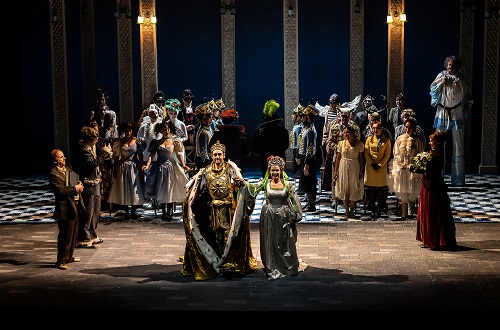
David’s programmatic symphonic ode Le désert (1844), which depicted the lives of a nomadic caravan in the Egyptian Sahara, had included a sandstorm, an oasis camp, and a musical portrayal of a muezzin’s morning call to prayer. Lalla-Roukh (1862), a fairy-tale set in the East, and the fifth of the composer’s seven operas, sustained the orientalist vein and set a pattern for later works which self-consciously drew upon ‘exotic’ locales and sounds, such as Bizet’s The Pearl Fishers, Delibes’s Lakmé, Gounod’s La reine de Saba, Meyerbeer’s Africaine and Saint-Saëns’s Samson et Dalila.
However, for audiences at Wexford Festival Opera, which is presenting only the second modern production of Lalla-Roukh, there’s a local link to complement the far-flung fantasy, for David’s librettists, Michel Carré and Hippolyte Lucas, based the action upon the eponymous collection of tales written in prose and verse, in 1817, by the Irish writer Thomas Moore, whose mother hailed from Wexford and who died 170 years ago this year.
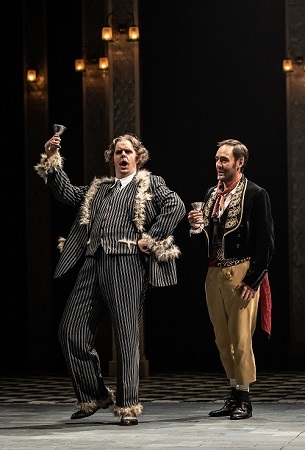
The opera presents the story of an Indian princess, the daughter of the Moghul emperor Aurangzeb, who is betrothed to the King of Bukhara (modern-day Uzbekistan). As she travels to meeting the King, she is entranced by the singing of a minstrel, Noureddin, and falls in love with her silver-voiced serenader. She arrives at the royal court resolved to reject the King and to return to Delhi and marry the penniless minstrel, much to the distress of the King’s envoy, Baskir, who threatens the minstrel with execution unless he renounces his love for Lalla-Roukh. As all good fairy-tales do, this one ends happily, for it turns out that the minstrel and the King are one and the same, the latter having disguised himself to test the truth of Lalla-Roukh’s love.
Lalla-Roukh was a huge hit in its day. It received one hundred performances at the Opéra-Comique in the year following its premiere, and the print run of 1,000 copies of the vocal score sold out the morning it was published. But, despite having been staged many times during the nineteenth century, in various different languages and countries, after 1900 the opera faded from the repertoire, until the Washington D.C.-based company, Opera Lafayette, performed and recorded the opera, in 2013 and 2014 respectively.
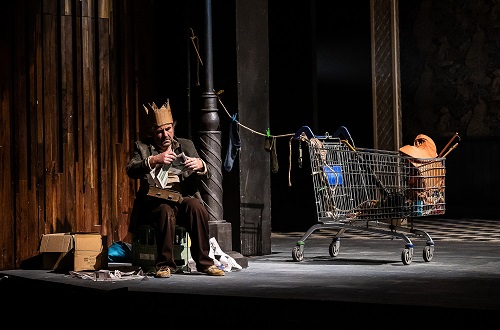
Perhaps the disfavour Lalla-Roukh suffered was a result of a growing distaste for sentimentalised, sometimes condescending, Western representations of the ‘Other’, which nowadays can leave a director seeking ways to avoid discomfort and embarrassment. In Wexford, the Irish director Orpha Phelan has sought to add a sharp note to counterbalance the saccharine sappiness, excising the opéra-comique’s lengthy spoken dialogue and replacing it with a Narrator – played by the well-known Irish actor, Lorcan Cranitch – who serves as a framing device outside the drama and fills in the plot that would have been relayed by the original dialogue. At times, Cranitch’s somewhat ribald narratorial intrusions (written by Timothy Knapman) are rather at odds with the delicacy of David’s musical score and the preciousness of the fantasy, but elsewhere the prosaic realism – our Narrator hangs a washing-line of dirty socks from his shopping trolley in lieu of celebratory bunting, for example – is a welcome complement to the romantic whimsey. Phelan casts her Narrator in the role of a traditional Irish storyteller and he persuasively draws us into the other-worlds that unfold.
We begin in the here and now, though, looking through the window of Leila O’Rourke’s Tea Emporium, with its oriental wallpaper and display dresser full of precious china, as the bourgeois clientele gather for their morning Darjeeling. Outside, our down-at-heel Narrator is dragging his supermarket trolled towards the garbage bins, in which he finds motley bric-a-brac, a ‘new’ coat, an apple to munch, and a large leather-bound book. As he settles down with his hoard and opens the cover of the book, so the shop frontage rises and we tumble through the looking-glass.
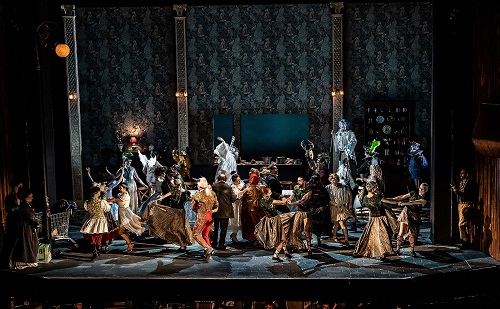
And, it does indeed feel as if we are following Alice into Wonderland. Madeleine Boyd’s fantastic costumes are a riot of colour, fancy and excess – fabulous hats and headpieces, feathers and fabrics – as epochs mingle in a timeless make-believe. Lalla-Roukh might be travelling with a circus troupe –a man on stilts strides through the opera without a wobble – but the air of elegance is never ruffled. When a regiment of ramrod-straight tin soldiers, sharply attired in blue and gold, cascade into a pile of cushions like a rumpling pack of cards, the grace of the execution is wonderful. Lighting designer D.M. Wood swathes the stage in teal, orange and gold. In Act 2, when the entourage arrive at the palace, tall, graceful pillars, ornamented with silver scallops, establish a luxuriant, regal ambience.
David’s opera is a delight – melodious, gorgeously scored, lusciously harmonised, and flowing easily through the lyrical arias, ensembles and choruses. Like all good nineteenth-century French operas, Lalla-Roukh has its requisite ballets, and the composer’s ear for vivid orchestral colour – shared here by conductor Steven White – is showcased in vibrant dances which are energised by percussive exoticism and lively rhythms, the latter interpreted with a neat Irish twist by choreographer Amy Share-Kissiov..
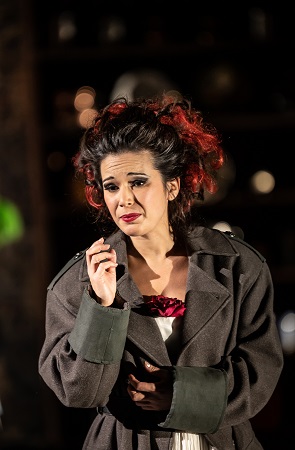
The cast relish the lyrical riches. Pablo Bemsch’s Act 1 romance spun its musical spell as the minstrel-King entertained the Moghul princess, the Argentinian tenor riding the high tessitura with ease and elegance. Noureddin’s wistful Act II bacarolle, the tenderness deepened by the beautiful harp accompaniment, was sweet and graceful. No wonder Lalla-Roukh was smitten. Bemsch communicated both the King’s sincerity and his regality. In the title role, the French soprano Gabrielle Philiponet captured the princess’s independent streak as well as her refinement, her shining soprano glowing across the registers and unwaveringly precise. Lalla-Roukh’s ‘O nuit d’amour’ at the start of Act 2 was ravishing, and the joyful thrill of both the princess’s final aria and the lovers’ closing duet was utterly winning.
As the princess’s companion, Mirza, the Irish mezzo-soprano Naimh O’Sullivan sang with clarity, nimbleness and sweetness of tone, and displayed a fine comic bent as she distracted Ben McAteer’s Baskir to facilitate the lovers’ assignation – hidden by the tablecloth of the tea-shop’s table, of course. The Irish baritone balanced buffo banter – the patter ever clear – with vocal finesse, in a strongly characterised performance. As his servants Bakbara and Kaboul, baritone Emyr Wyn Jones and bass Thomas D. Hopkinson were equally endearing.
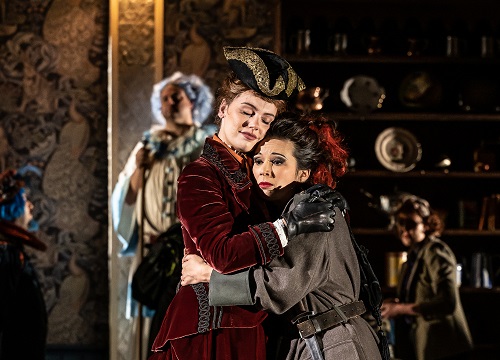
Despite David’s reputation – lampooned by that sardonic musician in 1876 – for an excessive fervour for all things of the East, the music of Lalla-Roukh actually wears its exoticism lightly. In Le désert, David had made use of what he described as ‘airs arabes’, genuine Egyptian melodies which he had transcribed while travelling in the country. But, while Lalla-Roukh makes no reach for such ‘authenticity’, neither does it indulge in gimmicky pastiche. Essentially, it’s a Donizettian comedy with an exotic locale and delicate colouring. Indeed, David shares the Italian composer’s ear for a good tune.
Perhaps Lalla-Roukh is ‘of its time’, but it’s certainly no operatic dinosaur. Fairy-tales are timeless and at Wexford Festival Opera, Orpha Phelan has taken down a long-forgotten book from a dusty shelf and found a story which transfixes, taking us into other-worlds – 1860s Paris and fantastic lands – through the prism of today.
The 71st Wexford Festival Opera continues until 6 November.
Claire Seymour
Félicien David: Lalla-Roukh
Lalla-Roukh – Gabrielle Philiponet, Nourreddin – Pablo Bemsch, Baskir – Ben McAteer, Bakbara –Emyr Wyn Jones, Kaboul –Thomas D. Hopkinson, Mirza – Niamh O’Sullivan, Narrator – Lorcan Cranitch, Dancers – Luisa Baldinetti, Sara Catellani, Andrea Di Matteo, Francesco Gerbi, Nicola Marrapodi, Giada Negroni, Andrea Carlotta Pelaia, Alessandro Sollima; Director – Orpha Phelan, Conductor – Steven White, Set & Costume Designer – Madeleine Boyd, Lighting Designer – D.M. Wood, Choreographer – Amy Share-Kissiov, Chorus and Orchestra of Wexford Festival Opera.
O’Reilly Theatre, National Opera House, Wexford; Saturday 22nd October 2022.
ABOVE: Lalla-Roukh by Félicien David at Wexford Festival Opera (c) Cliave Barda /ArenaPAL;